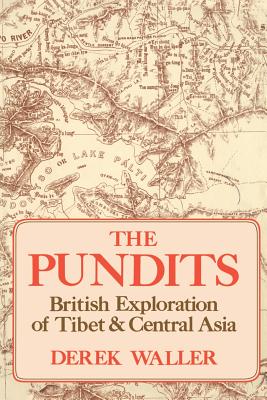The Pundits: British Exploration of Tibet and Central Asia

The Pundits: British Exploration of Tibet and Central Asia
On a September day in 1863, Abdul Hamid entered the Central Asian city of Yarkand. Disguised as a merchant, Hamid was actually an employee of the Survey of India, carrying concealed instruments to enable him to map the geography of the area. Hamid did not live to provide a first-hand count of his travels. Nevertheless, he was the advance guard of an elite group of Indian trans-Himalayan explorers -- recruited, trained, and directed by the officers of the Great Trigonometrical Survey of India -- who were to traverse much of Tibet and Central Asia during the next thirty years.
Derek Waller presents the history of these explorers, who came to be called "native explorers" or "pundits" in the public documents of the Survey of India. In the closed files of the government of British India, however, they were given their true designation as spies. As they moved northward within the Indian subcontinent, the British demanded precise frontiers and sought orderly political and economic relationships with their neighbors. They were also becoming increasingly aware of and concerned with their ignorance of the geographical, political, and military complexion of the territories beyond the mountain frontiers of the Indian empire. This was particularly true of Tibet.
Though use of pundits was phased out in the 1890s in favor of purely British expeditions, they gathered an immense amount of information on the topography of the region, the customs of its inhabitants, and the nature of its government and military resources. They were able to travel to places where virtually no European count venture, and did so under conditions of extreme deprivation and great danger. They are responsible for documenting an area of over one million square miles, most of it completely unknown territory to the West. Now, thanks to Waller's efforts, their contributions to history will no longer remain forgotten.
PRP: 294.50 Lei
Acesta este Prețul Recomandat de Producător. Prețul de vânzare al produsului este afișat mai jos.
235.60Lei
235.60Lei
294.50 LeiLivrare in 2-4 saptamani
Descrierea produsului
On a September day in 1863, Abdul Hamid entered the Central Asian city of Yarkand. Disguised as a merchant, Hamid was actually an employee of the Survey of India, carrying concealed instruments to enable him to map the geography of the area. Hamid did not live to provide a first-hand count of his travels. Nevertheless, he was the advance guard of an elite group of Indian trans-Himalayan explorers -- recruited, trained, and directed by the officers of the Great Trigonometrical Survey of India -- who were to traverse much of Tibet and Central Asia during the next thirty years.
Derek Waller presents the history of these explorers, who came to be called "native explorers" or "pundits" in the public documents of the Survey of India. In the closed files of the government of British India, however, they were given their true designation as spies. As they moved northward within the Indian subcontinent, the British demanded precise frontiers and sought orderly political and economic relationships with their neighbors. They were also becoming increasingly aware of and concerned with their ignorance of the geographical, political, and military complexion of the territories beyond the mountain frontiers of the Indian empire. This was particularly true of Tibet.
Though use of pundits was phased out in the 1890s in favor of purely British expeditions, they gathered an immense amount of information on the topography of the region, the customs of its inhabitants, and the nature of its government and military resources. They were able to travel to places where virtually no European count venture, and did so under conditions of extreme deprivation and great danger. They are responsible for documenting an area of over one million square miles, most of it completely unknown territory to the West. Now, thanks to Waller's efforts, their contributions to history will no longer remain forgotten.
Detaliile produsului










